Ferran Adrià: “Studying should be a pleasure, not an effort”
Ferran Adrià: “Studying should be a pleasure, not an effort”
The revolutionary chef, pioneer of gastronomic research and the arts and creator of elBullifoundation, Ferran Adrià gave the inaugural lecture of the new academic year of the UPF Faculty of Humanities, entitled “L’art i la cuina. Un diàleg durant segles” (Art and cuisine. A centuries-old dialogue), which took place on 9 November on the Ciutadella campus.
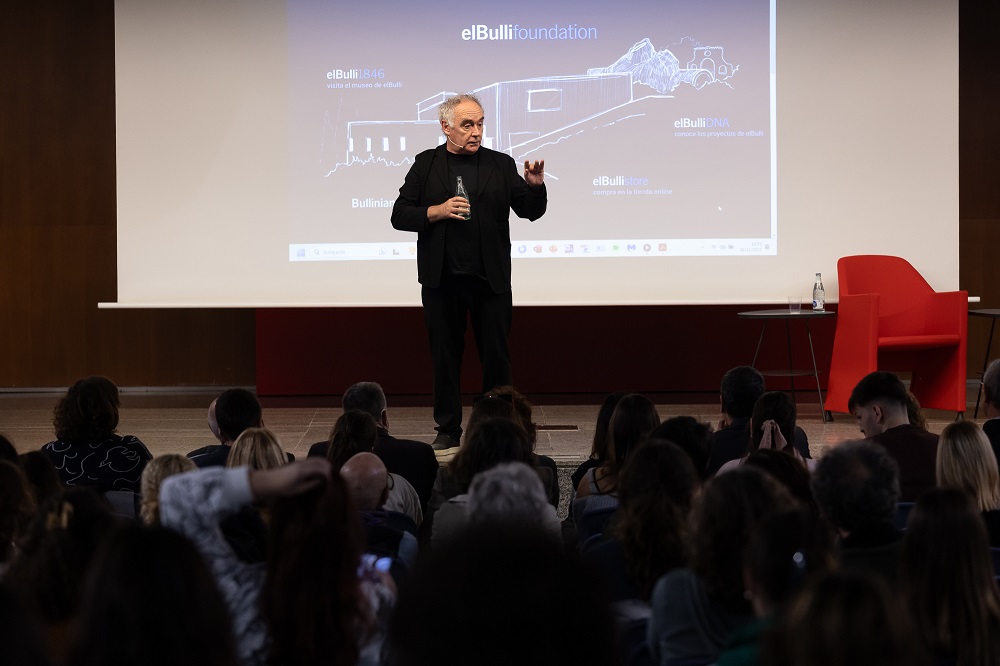
Ferran Adrià, the chef who revolutionized the field of gastronomy, a pioneer of research and innovation in the world of cuisine and the arts and creator of elBullifoundation, gave the XIII Miquel Batllori Humanities Studies Lecture, titled “L’art i la cuina. Un diàleg durant segles” (Art and Cuisine. A centuries-old dialogue), which opened the 2023-2024 academic year of the UPF Faculty of Humanities.
The ceremony, which was held on 9 November, at noon, in the auditorium of the Ciutadella campus (and also streamed), was chaired by Ana Delgado, dean of the Faculty of Humanities, who gave the welcome address and introduced the speaker, and Javier Aparicio Maydeu, Faculty vice-dean of Culture and Promotion.
In the second part of the event, following on from Ferran Adrià’s inaugural lecture, which culminated with the screening of a video about the elBulli1846 museum, where elBullifoundation is based (located in Cala Monjoi, in the Cap de Creus Natural Park, in the same place as the elBulli restaurant had been), there was be a round table about cuisine and the humanities.
Ferran Adrià was accompanied at the table by Sandra Montón Subías, an ICREA research professor and director of the Research Group on Colonialism, Gender and Materialities of the UPF Department of Humanities, and Javier Aparicio Maydeu, full professor of Spanish Literature and Comparative Literature of the Department of Humanities and co-director of the UPF-BSM master’s degree in Publishing.
Prior to the inaugural lecture, Ferran Adrià went on a guided tour of UPF Art Track, the University’s art circuit, which allowed him to visit spaces such as the Reflection Room, the Tàpies-Miró space and the Dipòsit de les Aigües building, which houses part of the UPF Library.
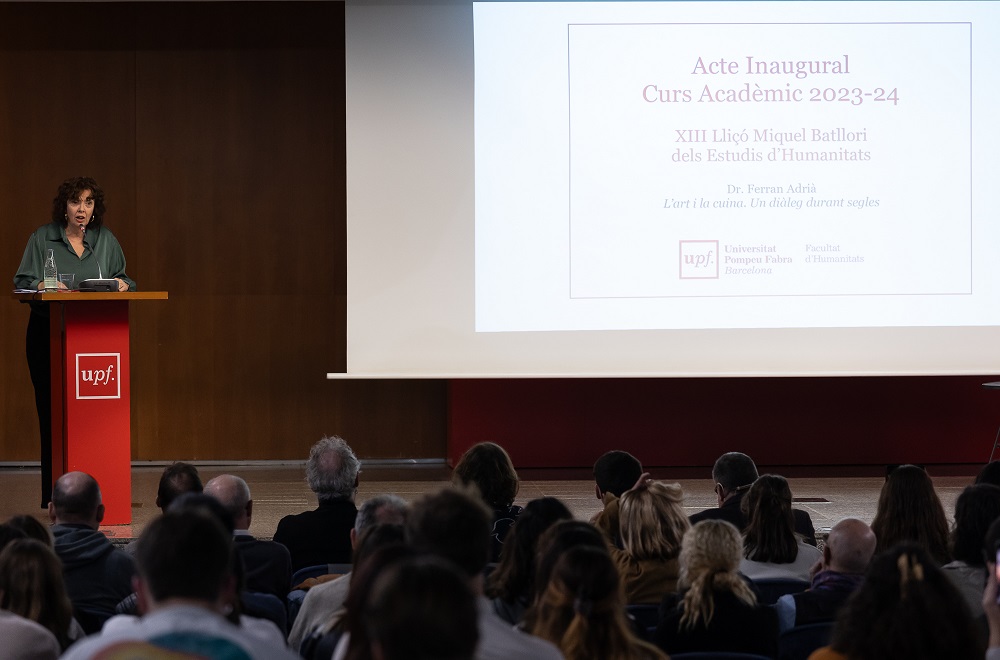
The UPF Faculty of Humanities, a project with its own model that faces the challenges of the future
In her opening speech, Ana Delgado, who described Ferran Adrià as “not only an absolutely exceptional chef, but a figure who represents culture, creativity, entrepreneurship, cross-disciplinary knowledge and innovation”, highlighted the value of UPF’s Humanities Studies, coinciding with the celebration, last year, of its 30th anniversary. According to the dean, “UPF created a risky and innovative proposal. It was its own model with unique multidisciplinary studies of history, language and literature and art and thought, when other universities divided it into separate faculties, and we seasoned it with language learning, extra-European studies and a global vision”.
Ana Delgado: “Greater importance should be given to the uniqueness of the UPF Humanities Studies model”
For Ana Delgado, in a context in which there is a tendency to discredit the humanities, and taking advantage of these thirty years, “greater importance should be given to the uniqueness of the UPF Humanities Studies model, and that is why we have some pending tasks”. In this regard, she pointed out that in the immediate future there will be a need to modify the Humanities curriculum and jointly reflect through debate, with the participation of all the voices that represent the humanities community at the University.
In this debate future debate, the dean cited a few essential ingredients that must be promoted, such as creativity, technology, and the culture of well-being and diversity. Endorsed by the results of the latest edition of the Times Higher Education ranking, in which UPF has improved in the Arts and Humanities (placed among the top 150 universities in the world in these fields), Ana Delgado expressed “a touch of pride at no longer being seen as the house servant of the University”.
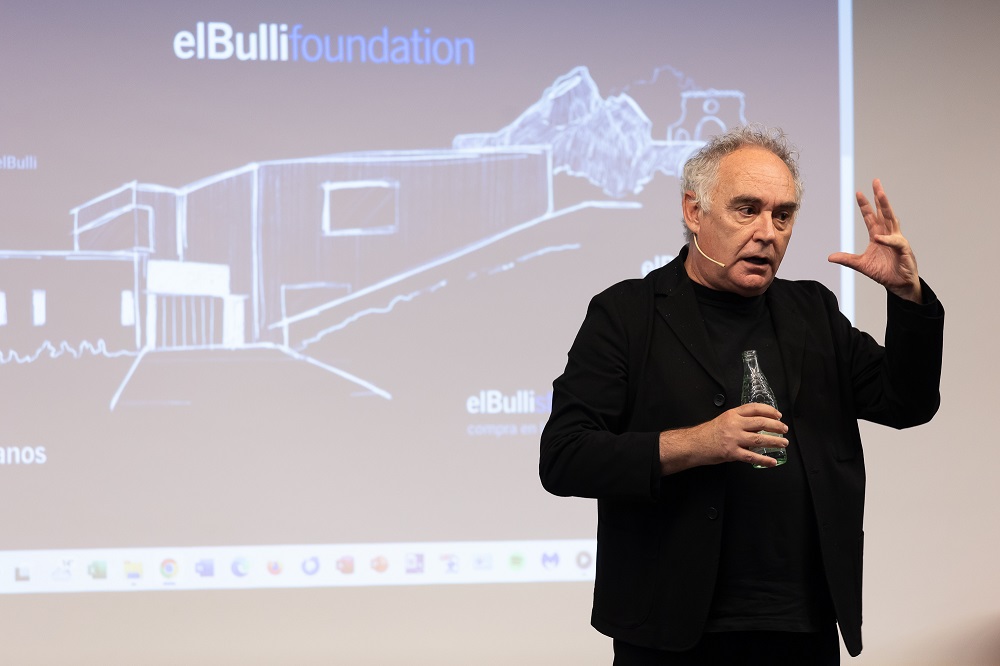
Inaugural lecture by Ferran Adrià
In his speech, Ferran Adrià began by reviewing his life course: from being a child who liked football and stopped studying at the age of 17, without a vocation for cuisine, through his first forays into the world of catering (washing dishes) in Castelldefels and Ibiza, and in the kitchen when he did his military service in Cartagena, until he entered elBulli in 1983 and soon became head chef. “For the first time at elBulli I saw a fine dine restaurant: when all the staff had lunch together, we talked about cuisine”, he explained.
“For the first time at elBulli I saw a fine dine restaurant: when all the staff had lunch together, we talked about cuisine”
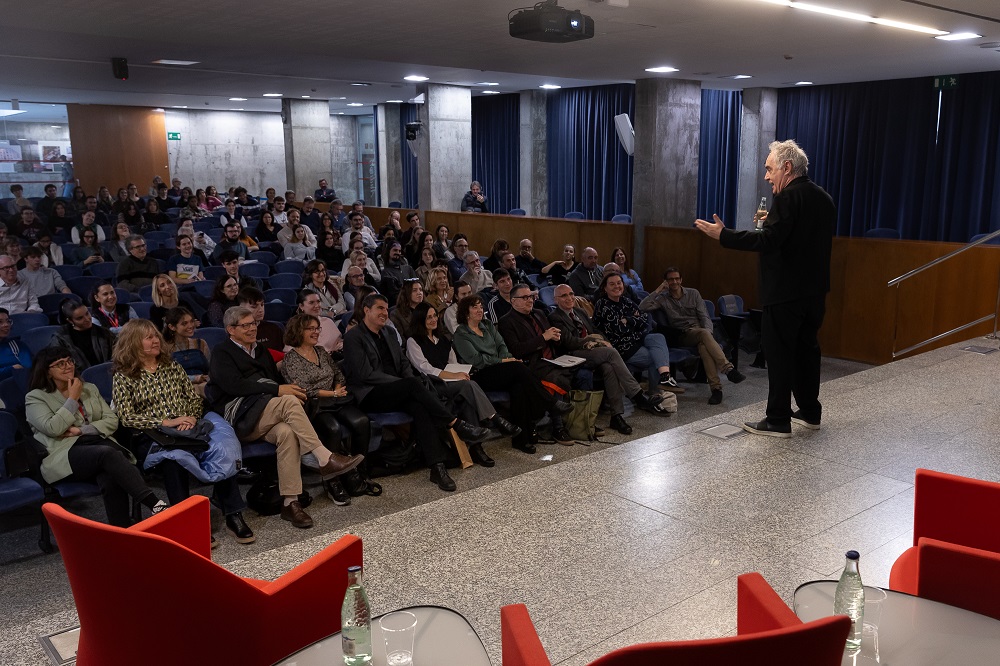
To get where he has, he mentioned some of the knowledge, attitudes and values that have allowed him to progress in life: having a knowledge of business management, and above all, never ceasing to learn, have been fundamental for him: Adrià immediately took an interest in the interdisciplinary relationships in the world of cuisine and the interconnection with areas such as science and design. “I have always been a scholar and I have enjoyed delving into my field, this is the difference between being good or very good at a profession. Studying should always be a pleasure, not an effort”, he remarked.
Other values that Ferran Adrià highlighted were generosity, knowing how to share, being a good person, highly respectful and honest (“honesty is vital”), questioning the status quo, being dedicated to your work, having a scientific attitude, and also being competitive, but only so much. “It sounds simple, but it’s hard to do”, he stressed.
He also reflected on different preconceived concepts that need to be analysed carefully, and that he has taken many years to understand well (for example, the concepts of creativity, creation and innovation, or the difference between natural and artificial products, which change depending on the discipline from which we approach them).
Sapiens methodology and evolution of the history of cuisine
Adrià reasserted quality, often overlooked in favour of innovation, and the need to get to the bottom of things. “When we were closing the restaurant, we wanted to understand what we had done”. “No tool can measure creativity: where can you see the level of creativity from 1 to 10?”, he reflected.
“Creative gastronomic cuisine didn’t enter the university until 2000. A lot of research and theses need to be done. We’re only just getting started…”
At this point, he talked about the Sapiens methodology, created by his team with the aim of connecting knowledge and understanding, and which is used in all elBullifoundation projects. Tested in 2014, it is a series of methods that aim to connect 200 knowledge portfolios, based on systems thinking and systems theory. For Ferran Adrià, “creative gastronomic cuisine did not enter the university until 2000. A lot of research and theses need to be done. We’re only just getting started… Twenty years are required for there to be good teachers”, he stressed.
In the last part of his speech, Ferran Adrià reviewed the evolution of cuisine throughout history, from homo sapiens to the contemporary era, when restaurants were born in France; the codification of haute cuisine in the West, around 1900; the creative pause between 1930 and 1960; the emergence of “Nouvelle Cuisine” in France in the late 1960s, up to the concepts of geogastronomy or “techno-emotional” cuisine of today.
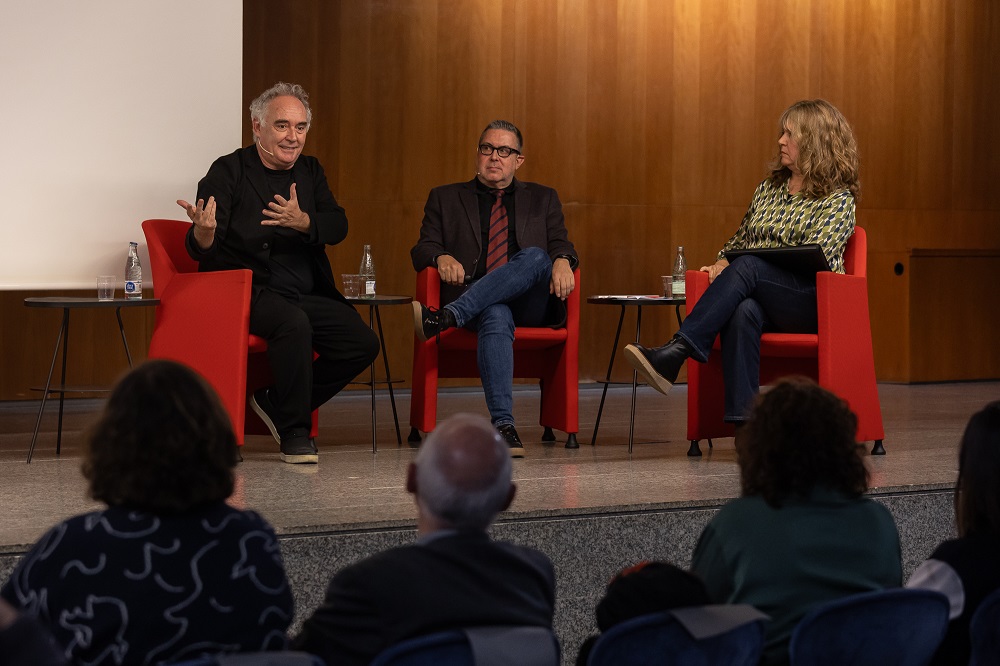
Round table on cuisine and the arts and humanities
The event ended with a round table involving Ferran Adrià, Javier Aparicio Maydeu and Sandra Montón Subías, in which different topics were addressed, such as the relationship between cuisine and gastronomy with the humanities, science, creativity, art history, the theory of colours, engineering, the history of film. Also mentioned was the concept of a global 21st century encyclopaedia, directly related to Bullipedia, a project led by Ferran Adrià involving a large team of experts.
Some of the points mentioned in the dialogue were the under-representation of women in the world of haute cuisine, the fact that there are few recipes in the last 100 years that have become established as traditions at home, the loss of the relationship between domestic cooking and haute cuisine, and the concept of culinary art (“Why haven’t cooks and chefs been painted throughout history?”).
An innovative chef who ushered cuisine into a new era
Ferran Adrià Acosta (L’Hospitalet de Llobregat, 1962) is a chef who revolutionized the world of gastronomy and ushered it into a new era: the North American magazine Time included him in the list of the 100 most innovative people in the world in 2004.
Adrià was the chef and co-owner until 2011 of the defunct restaurant elBulli, which throughout its history was awarded the highest gastronomic distinctions, including three Michelin stars, best restaurant in the world in the “The World’s 50 Best Restaurants” ranking drawn up by the British magazine Restaurant, or the S. Pellegrino Award for four consecutive years.
In 2013, together with Juli Soler, he created elBullifoundation, a private foundation with a family structure arising from the need to transform elBulli restaurant, with a vision of the future that is based on the desire to protect its legacy and spirit, generate quality content about the fine dining restaurant sector and promote an innovative attitude.
During career, among a host of other recognitions, he has been made honoris causa by five universities, including those of Barcelona, the Polytechnic of Valencia, and Aberdeen, been a guest professor at Harvard University for eight years, featured on the cover of the New York Times and participated in the prestigious Documenta fair in Kassel in 2007, an exhibition of contemporary art held every five years.
> Photo album of the event posted on Flickr

